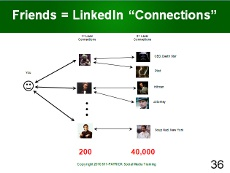ATD Blog
5 Lessons from the 2010 Webinars
Thu Dec 09 2010

It's hard to believe, but the end of the year is almost here (it's even closer when you think about how Christmas brings everyone's personal and professional life to a screeching halt). While each of us reminisce about the past year and plan for the next one, here are five quick tips we've learned from the 2010 webinars.
1) People Will Listen Better if You Use a Story (Five Ways to Use Business Storytelling)
People like stories. Storytelling allows you to be personable, captivating, and persuasive. Even if you're not planning on writing the next Great American Novel, this can still help you train.
Because let's admit it: no one wants to be trained using only facts and figures. Business may live in a world of facts and figures, but it's only a smaller part of a universe made of emotion. Stories enable you to make emotional appeals to people. If you use them in training, people remember your point better because they can relate to it.
So, to make your point clearer instead of having it lost in a swirling storm of numbers, use a story to explain it!
2) Always Do Your Homework (How to Select The Right Sales Training Provider)
I know it's hard to believe, but planning usually pays off. So if you have to outsource your sales training, you should plan to spend a great deal of time beforehand preparing. For starters, instead of letting the provider decide what you need, try to get an objective assessment of your situation either inside or outside the company.
When you do finally select a provider, work closely with them to not only develop a plan of action, but also to plan metrics to establish the ROI. After all, you're going to be responsible for explaining that to your supervisors; why shouldn't the provider be responsible for it too?
3) Sales Training Doesn't Just Involve the Trainer (Sustainable Sales Training)
Just because you train a salesperson doesn't mean that they need to listen. What this means is that unless change is institutionalized, it's often lost, with most training lost less than 90 days after the program. What's one great way to make sure that training sticks?
Train the sales manager first.
After all, the sales manager is the person that the sales team works the closest with. If you can get the sales manager to reinforce the new behaviors even when you're not around, you have a much better chance of seeing successful training.
To adapt an old clich: teach a salesperson and you'll feed them for a day. Teach their sales manager, and you'll feed them for a lifetime.
4) Your Team Isn't Using LinkedIn Enough (LinkedIn for Sales)

That statement might sound rash, but think about it for a second. LinkedIn allows you to prospect for the key decision makers within an organization (use the advanced search option to set location and job title). You can also use it to make cold calls warmer by checking to see if you know any of the same people the person you're calling does by checking second or third degree connections.
And most importantly, it can replace business cards. Because after all, when someone gets promoted/leaves that company, that card is almost useless to you. But because of LinkedIn's dynamic nature, it's almost like having a constantly updated rolodex.
So are you still sure that you're using LinkedIn enough?
5) For True Sales Transformation, Focus on All Parts of Your Business (From Functional Support to Strategic Business Partner: Maximizing Sales Training ROI)
The first step in true sales transformation is defining what everyone's roles are. By doing this first, you can not only manage expectations for the entire process, but also enable everyone to hit the ground running. As a plus, by making sure everyone knows what they'll be doing, you're also helping them take ownership of it.
While you're improving and streamlining operations, don't be afraid to ask for customer evaluation too. All too often, companies will gear new policies and processes for making it easier to work within the organization. To avoid this pitfall, make sure to garner outside evaluation too.
What are some of the things you've learned during 2010? What are your expectations for 2011? Let us know in the comments section!
